#in video veritas
Explore tagged Tumblr posts
Text

video kill the radio star
2 notes
·
View notes
Text

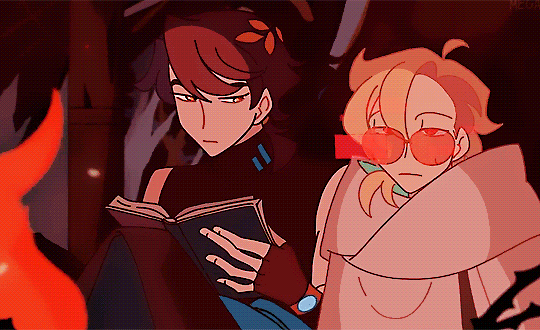

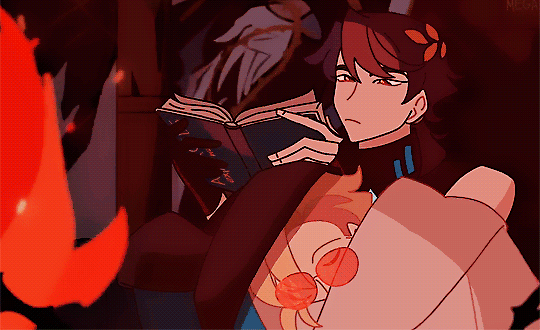
Ratio and Aventurine before Rota Fortunae's events
#honkai star rail#hsredit#honkaiedit#dr ratio#veritas ratio#aventurine#ratiorine#aventio#video games#gifus#otp: do stay alive#man I love the Rota Fortunae team like they just GET it#their whole dynamic is portrayed so well#how can they be so cute and comfortable around each other???? I'm gonna throw up#the way Ratio just lets Aventurine sleep over him...#we're eating so good...#he's reading about androids too :_)#ah...
5K notes
·
View notes
Text


what is wrong with them!!!!
#this video was literally so funny#i love them!!#my silly little guys#if you saw me repost the aventurine one NO YOU DID NOT#hsr aventurine#dr ratio#veritas ratio#honkai star rail#hsr#hsr fanart#sya's art
362 notes
·
View notes
Text
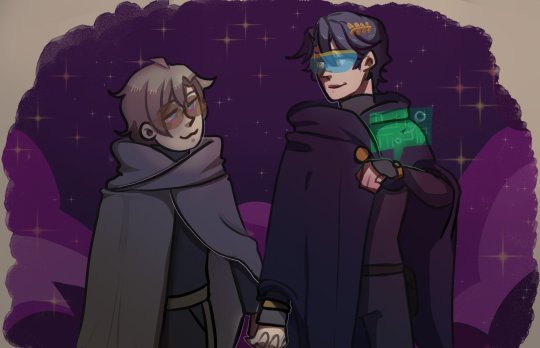
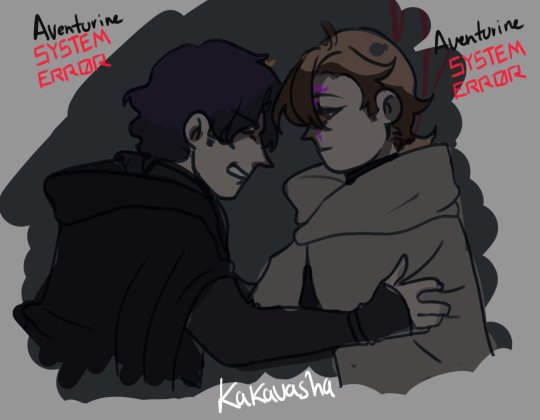
#dr ratio#veritas ratio#hsr aventurine#aventio#i swear to god when i did the first one i didnt see the video and then 30 min.later THAT HAPPEND and i was in shock friking doom yaoi#hijidoodles
186 notes
·
View notes
Text
*hits you with a follow up* ah shit sorry *hits you with a follow up* oh oops *hits you with a follow up* sorry accident *hits you with a follow up* ah i didnt mean to do that *hits you with a follow up* gomen oomf chan *hits you with a follow up*

#hsr#honkai star rail#gen this is such a funny team to use#hsr aventurine#aventurine#hsr dr ratio#dr ratio#veritas ratio#hsr moze#moze#hsr robin#hsr sunday#robin#sunday#hsr showcase#i mean kinda#video
199 notes
·
View notes
Text
Just looking at some of Ratio’s voice lines and this one. What do you mean “our man?” Idk, sounds kinda gay to me

#honkai star rail#hsr#hsr dr ratio#dr ratio honkai star rail#honkai star rail dr ratio#dr ratio#veritas ratio#aventurine#hsr aventurine#honkai star rail aventurine#aventurine hsr#aventurine honkai star rail#aventio#aventurine x ratio#ratiorine#idk guys#sounds kinda gay#plus he acted tsundere-ish in that one video#I think he’s more whipped for aventurine than the other way around#he’s in denial for sure#bro pretends like he can’t stand him yet has so much to say about him#that’s gay#I mean our man?#really ratio?#can you get any gayer?
156 notes
·
View notes
Text

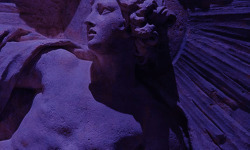

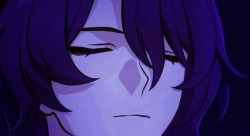

✦ V. HE IS THE MOST PITIFUL OF MEN
'The stagnancy was broken once more. Lips pursed in displeasure, and the face shrouded by the shadows of the night disappeared back into the darkness. He who remained asleep was none the wiser—caught in the throes of surgeless rest. In the morning, the sculptor would stumble into the chilly studio—waking up with strangely light shoulders and an unclouded mind—only to find his magnum opus gone. Within the chalky base remained the imprints of footsteps, as though the statue had merely walked away. The cold glass skin of juice shattered against the flagstones: seeping a bleeding red into a pristine pathway. Just like in his restless dreams, that figure left him far behind once again.' • . * cursed prince ratio + alchemist m reader rough design for minoan fashion ratio here warnings: video game violence, death? kind of? tyranny (are we surprised), male-coded reader (or at least the in-game avatar is) wc: 11.4k
LAMENT OF OUROBOROS MASTERLIST
HONKAI STAR RAIL MASTERLIST
MASTERLIST ・゜・NAVIGATION

Night fell over the Borderlands: still and cold and silent. It crept in with the blank grace of an assassin, slated only with the condensed breath of the sculptor who quietly shut his book and swilled the last dregs of tepid tea into his mouth. Tapping against the worn, leather cover was the blunt—almost sleepy—thump of the pen, while a lazy hand mindlessly traced formulae into the soft material of the couch.
The final line of a sonnet seeped into his mind.
The spectre of lavender ghosted his mouth.
In the end, the evening consumed him once more. It was a night like any other—the bound poems collapsed against the tranquil rise and fall of his chest, and his eyes fluttered closed. The clatter of a pen against floorboards broke the hush, but slumber already cradled him. Like hands dragging souls to the underworld, the descent into unconsciousness was as easy as it was natural: something he was unaccustomed to.
Something had shifted.
There was no herald leading him to the cliff sides in the pitch of night. The dreams no longer featured his muse wandering the lonely fields under an equally lonely moon: a crescent smile lighting the deep jet curtain of the sky. Scenes that used to be coherent had fragmented: the smooth coils of a scaled behemoth flashed past in his mind; the scent of a laboratory and teaching a certain apprentice the fundamental tenets of chemistry; and finally, the few good memories of a life left long behind. Cigarettes on a misty afternoon. Rich coffee, and a stack of books. Relaxed conversations with people he’d never see again.
Something had changed.
Those hands, once so eager to sculpt and sketch, to rid himself of the incessant being who plagued his thoughts, had become placid and unmoving. The chain of cognition that shackled him to the pursuit of creation had shattered; Atlas passed on the burden of the sky to somebody else. No longer did his fingers stretch after the flashes of damson locks, and neither did he picture the frigid stare of a man who barely ever glanced behind himself.
Who altered the tapestry of his mind?
It was a question he could not answer; at least, not while he slept peacefully. Only his steady breathing stirred the otherwise silent space, and even the clumsy pad of footsteps failed to break the serenity of the scene.
A hand reached out, tentatively. In the waning moonlight, it was illuminated like the palest of jades—just as cold too, for when a thumb brushed past the sculptor’s cheek, the sleeping man shivered minutely but ultimately did not wake. The hand retreated, startled—as skittish as a foal, as if it hadn’t quite adjusted to this world.
“Mmh, Aventurine, always make sure to take at least three trials.” The stagnancy was broken once more. Lips pursed in displeasure, and the face shrouded by the shadows of the night disappeared back into the darkness. He who remained asleep was none the wiser—caught in the throes of surgeless rest.
In the morning, the sculptor would stumble into the chilly studio—waking up with strangely light shoulders and an unclouded mind—only to find his magnum opus gone. Within the chalky base remained the imprints of footsteps, as though the statue had merely walked away. The cold glass skin of juice shattered against the flagstones: seeping a bleeding red into a pristine pathway.
Just like in his restless dreams, that figure left him far behind once again.
. ⁺ ✦
Senator Anastasia loves playing with guns—shot his wife and two kids dead he did,
Senator Anastasia loves his guns.
Senator Demetrios secretly funded drug trafficking—against all pursuit of amoral alchemy he is,
Senator Demetrios loves his drugs.
Senator Leander has rather sticky fingers—-rigged the vote he did,
Senator Leander loves his dirty tricks.
—Excerpt from a street ditty sung in the 1435 Second Amber Age, modern New Metis, a month before the elections
(Origins uncertain. Appears to have been spread, either intentionally or unintentionally, following the mass exposé released by anonymous whistleblower writing piece after piece on high profile politicians who run the nation.)
. ⁺ ✦
‘New Metis is on the verge of irreversible decay: the last vestiges of an empire that should’ve been reforged a whole Amber Age ago.
The apt metaphor often used to describe the Metis of old is the fable of the rotten seed—that which is spoiled shall too bloom spoiled. Old Metis was addled with corruption, bribery, and a gross misuse of power which was supposed to be carefully checked and balanced by its governmental system. Poor considerations of its citizens led to a desperate fight for rights that had gone wholly ignored—the famed, retold and dramatised Scholar’s March of 786 of the Attican Calendar that forged a new path for Metis to travel on, free from the despair of the past.
Or so the plan was written as.
New Metis has attempted fruitlessly to distance itself from its brutal past.
It forgets that its reins never changed hands.
Who makes the legislation? Who debates on the fate of our scholars sent to study in the capital of learning? Who dictates the politics, thus the future, of this city-state?
It is not the people who marched who forge our path. It is the people who lingered in the shadow of a scapegoat to seize power once more.
Never forget this truth, Metis, for the drums are starting to beat once more.’
— Inana, P. (1435 2AA). Rotten Seeds of Metis: Witnesses of the Fall. Realpolitik Magazine, Issue 307.
. ⁺ ✦
“Must feel liberating,” the matron commented. For once, the gleaming measuring rod rested on HER lap as SHE rested a chin on HER marked palm. “He no longer feels the burden of two fates.”
“He lost art he poured his soul into,” the maiden snipped. For once, HER face lacked its youthful cheer, but rather contained a twisted sense of rue. It was out of character, but neither older nor the oldest commented on it, for THEY too felt the same strange regretfulness. “I don’t think he’s feeling any of that lightness right now.”
“It’s better than the prince’s fate,” the matron muttered, though HER voice wavered slightly. “Now he has taken on the path of setting right the sins of his forefathers.”
“Lack of closure is damning too,” the hag interjected. “Look where it led him.”
“They aren’t the same,” SHE argued back. “The sculptor can finally focus on himself.”
“Both had their lives forever rerouted,” the youth snapped. “Don’t attempt to assuage your guilt over it. It was fair, but the chance they’ve been allotted is tough—no sophistry will change that.”
The space was silent: a lull in the tapestry.
“There are new winds in the learnéd city,” the crone finally spoke up. “At long last the change the prince hoped for will be catalysed by none other than himself. That’s all we could ask for—he’s no longer stuck in limbo, and Metis can have its age of heroes.”
THEY were silent again; for when had the three started caring about how humans felt?
“That foolish boy,” SHE murmured. “It’s finally been set right, but he won’t be happy for a long time.”
. ⁺ ✦
Time moved on. The sand in the hourglass marked the bittersweet end of summer: a tumultuous thing, filled with both the elation of creating art and the tragedy of losing it. You were incredulous at first, filled with a denial of reality as you sank to the floor of your studio. Only the base of the sculpture remained; oh so lonely without its muse upon it. Kakavasha couldn’t have touched it, no matter how much he glared and gritted his teeth. It was unyielding to all but you, after all.
It simply… walked away. Trod a path far from the tranquil garden it was situated in, on the road of absurdity in this stupid game. You found it hard to suppress the anger; nay, it was more like stewing irritation. Calloused fingers spent months—night and day, morning and evening—hungering for something other than food, absorbed wholly to your craft. All that time, gone. For naught. You sat in the empty studio, surrounded only by fluttering pages upon pages of sketches: charcoal lines that seemed to mock you, to remind you this was in fact reality and not some twisted dream.
You bargained. Pleaded with the lines on your body to cooperate, wishing for you to figure out what exactly happened to your hard work. Nothing—not a whisper, nor any hint, emerged from the crime scene, still flaked with the residual stone. There was no thread tying the two of you, nor a map that could possibly show you the sculpture’s location. Only a single conclusion emerged from a murky cesspit of confusion: something was blocking you, something even more powerful than yourself.
It was easy to fall into despair. You couldn’t bring yourself to rid the space of the stone, but piece by piece you swept the shards into a box—then finally worked up the courage to muster a spell to move the plinth to the attic. It hurt slightly less when you could no longer see it: carefully filing away the leagues of sketches into a cabinet,
Acceptance betrayed you when you woke up one morning and realised the itch in your hands to carve was gone. Vanished, like it never existed. As if you were a marionette with its strings cut, you’d never quite felt so light before—and it made you wonder: why did I make this in the first place? Were you finally in possession of your senses? Were you free from the fog in your mind?
True to his character, Aventurine didn’t question you (you wouldn’t exactly know how to explain it even if he did ask). He eyed you as you spent an hour sewing on the couch, he shot you a glance when you came back after re-renovating the studio, and he only coughed once or twice in surprise as you hauled in boxes of fragile equipment. He seemed more relieved than not, at how short-lived his sculpting apprenticeship had been: staring down at the spot where your art had been with a strange, vindictive sort of look on his face. Though, his brows wore a look of confused, yet pleasant surprise—for him, it seemed to be an unexpected, though not unwelcome, boon.
You ignored it, just like he ignored the dust settling on your chisels as you picked up your goggles once more.
It seemed you couldn’t quite deny your roots.
The lab coat fit like a second skin, stitched by hands made deft from a decade or so of odd work. It was pristine; thick white synthetic material developed by the scholars in Metis, embroidered with your name: bright against the blank coat, and a reminder of the life you left behind. Your hands stopped smelling of clay and began trailing behind caustic acid while you worked, mixed with arenes and the artificial scent of organic molecules.
Within the forest, you took apart plants—systematically disassembling them and breaking them down on a molecular level as you tried to unravel this world. Shipments after shipments of textbooks came and went, and you pored over each one with a fervour unseen since you sculpted: jotting information, culminating in writing paper after paper on materials, molecules, quantum phenomena and everything in between.
Kakavasha seemed to appreciate the change—dutifully assisting you in your analyses as a shadow would—and soon he too began leaving a trail of chemicals behind.
A late night turned into two, two turned into weeks of restless evenings as you worked in the laboratory to collate the work into a journal on concepts you’d already mastered on Earth, but hadn’t been explored in Ouroboros. If Aventurine saw the dark circles marring your face, then he sure as hell didn’t say anything.
A burden had been swapped for another, but this one felt lighter than air.
Over in the mainland, things too were changing—at an unprecedented rate.
. ⁺ ✦
In the shadows of an alleyway—pristine despite the darkness lurking in the city—a figure leaned against a wall, tracing graceful fingers across his bracers as he examined the people milling about. His eyes grazed the way they dressed, the way they carried themselves—some furtive, some bright and cheerful, but all with the intrinsic quality of wanting to move on from the broadly lit street.
It was the same as it had been a millennium ago.
Strike one.
He gazed at the law enforcer coldly as the man forced him into the sweltering sun—only harsh utterances escaped his mouth. Shady characters like you deserve arrest, he heard; words tangling in his ears like cobwebs, just as fragile as whatever the officer was compensating for. The silence seemed to only irritate the man more, who sharply marched—paraded—him straight to an office where a stern supervisor lectured him on laws he had seen his own brother write.
Strike two.
And still, the officer—though trigger happy as he was—had that odd look in his eyes. He wanted to punish the long-deposed prince, he wanted to keep him in the Metis city gaol for the night for loitering, but couldn’t— that would be drawing attention to the officer’s existence.
Strike three.
The newspapers and books had all been carefully monitored. Entry to the library was free, and he chose an alcove near a slightly dilapidated section, pressing the crystal-powered tablet on the table—after curiously examining the mechanisms with a cursory enchantment that was far more ancient than the very building he sat in.
Scholar’s March, uprising against the corrupt royal family, power to the government and noble archontes. He scrolled through the device with apprehension—the database containing all available texts in this place—and concluded there was no information here worth his time.
It took him approximately three hours, combing meticulously through each shelf while steadily building almost imperceptible tendrils of enchantments to aid him in his search. Not a student spared an eye, while the machines built to combat magic that surrounded the place didn’t so much as jolt. He almost sneered.
A revolution had been encoded in his simulations of the future. It had been inevitable. Yet, nothing had changed. The quality of magic had degraded, education was still not allowed to develop and flourish naturally, and in the end, nothing had really changed.
Strike four.
He left in a pensive sort of silence. The wiretap he’d set around the city told him all he needed to say.
Changing how Metis worked was long overdue.
. ⁺ ✦
“I think you’ll finally be able to present your papers in person,” Aventurine waved a thick sheaf of papers in front of you while you carefully decanted an aldehyde into a boiling tube; you could only stare at him through the warped glass as he spoke whatever information he’d gleaned. “Metis has officially begun the repeal of its heresy laws and censorship policy—this is the first issue of a brand new Metisian newspaper, over here is another one, there’s a few administrative letters from the index of banned books and texts, one of which was your own.”
The studies and articles you’d written, on material sciences, quantitative chemistry, and everything in between, had been receiving attention everywhere but Metis—for the sole reason of their references to alchemy in chemistry. It had been a year since you switched focus to your specialty once more, a year since your magnum opus had disappeared, and a year since you vowed to contribute to the world you were put in.
The scientist based in the treacherous Borderlands. A mind far undervalued by Metis. The brain behind the legendary element discoveries of mirthium and erdium. What new theories will he propose now?
It wasn’t front page news, though, certainly, on the scientific papers it had been. You glanced at the wads of soggy newsprint, then at the neat folders containing medical proposals behind him, then gave a faint smile. “You think they’ll accept me as a Sophos?”
“Yes.” His words left no room for argument—a firm, resolute tone that belied none of his honeyed tongue. “They’ve been fools far too long, masquerading as geniuses.”
“I suppose,” you conceded, adjusting the temperature dial on the heater. “Though the limitations on their study have produced some incredibly advanced specialisation in science, I’m glad the scholars are free from the shackles that bound them.”
“So who’s going to teach them what they previously couldn’t learn?” His neon gaze was firmly locked onto yours. There was a deeper question hidden within his relentless stare: are you going to step foot in the place you’ve avoided? Will you leave the memories of this place behind?
“Those who have relevant expertise,” you answered neutrally. Diplomatically. You’d considered the idea, toyed around with it in your brain. Tasted it, even —rolling it in your mouth this way and that as you contemplated exactly what to say if you were ever asked this. In the end, your words came out grey and foggy—totally impersonal. You frowned, and Aventurine caught the slight furrow between your brows. “I won’t live there, ever. If I get invited as a lecturer or student, I’ll remain here. It’s high time they upgraded their transport between there and the Borderlands regardless.”
And if worse comes to worse, I could finally finish working on those high-grade teleportation rings, you added silently, though Kakavasha had known you long enough by now to recognise the wanderlust in your eyes that indicated a new project was brewing in your mind. There were several formulae decorating your legs that indicated flight, or at least travel, and you simply hadn’t the opportunity to decrypt the letters.
“Right. You’ve already received degrees of knowing from several other universities, and then some awards,” he murmured. “If anyone’s qualified to speak on these groundbreaking concepts…”
The revolution had been bloodless and quick. It suited the scholastic city, based on the fast dissemination of information and logs that had forced those in charge to abruptly resign. In fact, it had been so rapid that the ripples barely had time to reach you—the ink on your manuscripts had only just dried—when news of the fall of the government and the implementation of an almost mechanical, algorithmic government had been brought to you by Aventurine. New officials were elected almost instantaneously, driven by masses of students that had crammed into booths that had long fallen to disuse, over disillusionment with politics. The youth and elders alike had voted for each member of a temporary Council that seemed to be watched over by the benevolent whistleblower who’d first triggered the first falls of grace.
You hadn’t quite seen anything like it—waiting with baited breath for either the tempering or the brutal collapse of the rejuvenated city. And surprisingly, it held. There was no external influence, no devastation as Metis erupted in civil war. This was not Earth, you reminded yourself, and it truly wasn’t.
A heavy envelope came only a week later into your locker that you reserved at the small post office in Metis. It was cream-coloured, and faintly fragranced of vermouth and atrament. You sliced it open with the bone-sword that hung by the mantle, ignoring Kakavasha’s wide-eyed stare as you did so. The contents inside were typed in neat print, and all but one line stood out to you.
We invite you freely to earn your distinction as Sophos in an abbreviated period, and cordially wish you stay on to teach integrated enchantment through alchemico-chemistry.
You smiled, but it was a strange, hollow thing.
“You… got it? You got the job?” he murmured, a selcouth blend of apprehension and a little, manic grin.
“It’s likely, though…” you trailed off as a second letter caught your eye, tucked in between the thick stack of a contract and a printed copy of one of your works—which you swore hadn’t been there before. On the mauve paper, there was no return address, though on the front there was ‘doctor’ printed. You frowned, and it faded from view—so fast you might’ve imagined it. Doctor had no equivalent in this world, after all. There was Sophos, there was Tibel, there was Speaker, but there were no doctors.
The contract forgotten, you set the remainders down on the workbench and quickly slid the purple envelope open. This one didn't smell like the faint traces of alcohol, but rather something abandoned. Slightly dusty. Like a lost terrace, or even an old, hidden path. Mildly entranced, you slipped the small card out from the inside and read the elegant script.
Your theses were captivating to read through.
Nothing more. You turned the card, yet the blank side taunted you. Quickly, your eyes darted back to the bound pages of your work, and upon opening it, it seemed the sender had left you something else to mull over.
Each page had bloomed with flowering, delicate script.
. ⁺ ✦
No mauve letters came again.
You didn’t anticipate them, nor did you feel any particular pang of regret that you didn’t see that elegant curl of font again. In fact, you forgot about it: laying in a drawer, slowly gathering dust. It was only a month or so later—after publishing a riveting piece on capturing sunlight from the two suns to mass convert to energy, rather than relying on finite crystals, and then perhaps a paper or two on reusing consumed crystals for crystallography using various waveforms—that you finally remembered the letter, as well as the invitation from Metis.
Acclaim was good, but there was something about seeing Sp. in front of a name: a weight that was comforting, like the solid thud of a footstep rather than the burden of a sky on your shoulders.
One particularly foggy evening, when the moon and stars were hidden from view and the only thing that remained was a grey, motionless sky, you stared at the letter for a long while. The drawer had only been opened to shove another newspaper—A Look Into The Mind of the Crystal Scientist—inside. Situated alongside the edges was a pamphlet: Real Estate in the Borderlands, as though it was some inspiring location. Frowning, you tossed both rags aside, picking up the card once more.
As the faint flavour of stone still emanated from it, you thoughtfully gazed out of the window West-ward towards Metis. The great city loomed, invisible through the distance and fog and in your scattered mind.
You thought about your garden. A small little haven, where you enjoyed tea only with one other soul in your company. Even the monsters here had long learnt to tread carefully after you’d left the carcass of the giant snake deep by the river—other than the steady chirp of birds, the fauna didn’t bother you.
It was tranquil, but the sudden emphasis of your base in the Borderlands irked you. The more you mulled over it, the faster your pace quickened upstairs: where bound volumes of your works now sprawled over most of your bookshelves, where you wove a bag into existence complete with space-warping.
“Aventurine,” you announced, and the man startled from where he was busy polishing a conical flask. “I’m going to Metis.”
“Excuse me?”
. ⁺ ✦
Excuse me?
Despite his incredulity, Aventurine dutifully put the flask away and packed himself a bag too, rather than offering to stay behind. Despite him glaring in the direction of the city-state, as though it was stealing you away from him, he only wore a cheerful smile whenever you glanced in his direction. And despite the occasional, colourful imprecations he muttered under his breath as he boarded the train (first class, courtesy of the heavy gold hidden within the jade pendant), he only had good things to say about your search for distinction. In all honesty, you found his disguised pettiness extremely amusing.
His eyes searched you, like he was making sure you were truly on board with the sudden change. You didn’t comment, electing to watch the countryside flash past—interspersed only with surreptitious glances at your winding tattoos.
He noticed. Of course he did.
“Are you worried?”
He’d muttered the words as though he was afraid the great planet and two suns would hear him. You shook your head, though you still wondered silently if this would go like the last time you visited Metis. Getting stared at as the tattoos branded you as something other: an easily identifiable trademark you weren’t quite ready to sport. At least, not until you reviewed the situation in the city.
“I can hide them for you, for a bit,” he offered, and it was then that you finally met his eyes. He was squinting them, almost—lids low against the spheres, while a smile crested upside down in the fold beneath them.
“How?” Curiosity piqued your expression when you felt an almost-familiar wisp of something curl in the air. Almost-familiar, because the faintest idea of it seemed to be something you’d witnessed only once. With a start, you realised you could see the smoky substance as it coiled and interacted with the medium that surrounded it. In fact, the intangible matter that accompanied the strange power this world had given you, too, was batting and toying with the plumes, entranced.
Kakavasha flinched, though only slightly. “You can see it?”
“Slightly,” you murmured, and the alchemy that bound you in this plane accepted the gift he brought, dulling the vibrance of the lines on your skin until they melded into flesh and dermis. The patterns thrummed, invisible and inconceivable to all but you—a merge between his glamour arts and your unique ability. “It’s pretty.”
A smattering of pink cast his face into a rosy hue as he watched you watch your own hand—clearly fascinated by the change. “It’s a glamour.”
He whispered the words in the tongue of honey: dissipating into the light rays like dust motes, and cascading into your mind as you wondered at the implications behind each syllable.
A secret, the root of the word conveyed. Deceit.
. ⁺ ✦
The tiles paving the roads seemed off. Different. People walking by had a cheer in their step they didn’t have previously. You said hello to nobody, yet three vendors shoved mountains of fruits, spices, and sheer, silky cloth into your hands that felt far too exquisite to touch this casually. Dumbfounded, you glanced around, only to see others going through the same predicament too—wares being passed freely—as if the fall of the corrupt government was something to be celebrated weekly. Understandable.
It almost distracted you from the very thing you first noticed when you stepped foot on land. Stone. Not any sort of stone, but one that still lingered in your memory—waking or otherwise—and one you could almost taste, gritty and chalky and everything tangible. You swallowed, suddenly, storing the gifts in your bead (though not before heaping money into the protesting vendors’ hands).
“What?” Kakavasha, who’d previously been snickering at your troubled expression, sobered as your eyes meandered the roads. Your focus settled on the distance, and you could feel something shift. Along the city skyline, you thought your alchemy finally gave you the answer to your long-asked question—where did my statue go?—though it was vague and incoherent.
You returned to reality after a long pause, glancing back at the golden-haired man beside you. In that split second, you decided to keep your peace and wait for night to fall.
“Nothing.”
He didn’t reply, staring long and hard at you instead.
. ⁺ ✦
Metis doesn’t sleep. Anyone who came to the fabled scholars’ city knew this: returning to their homelands with tales of the whirring urban centre, like a massive brain that simply didn’t rest. The artificer’s lamps quietly burning in each home and study centre had long since replaced the stars in the sky: lit up with the aspirations and dreams of students who desperately longed to etch their names on the lengthy annals of history.
It was—and would always be—the perfect time to sneak out. Under the cover of darkness, scrutiny was lax as ever; nobody spared the scholar meandering through the streets a second glance, especially as the rules had been completely abolished and rewritten by the new Council and Adviser. Your steps carried urgency despite your outward languor, and you half-wondered if Kakavasha had noticed you’d slipped out of the hotel room.
The source of the signal was weak. It pulsed feebly, like a dying heart feverishly (and foolishly) clinging to a life that was sliding quickly out of reach.
On the paved white tiles, your feet left behind firm, resolute footsteps as you headed to the ring of buildings directly behind the sprawling university. Upon observation during the day, it had been where the faculty allegedly worked. Where you’d work in a few months, if your extensive research qualified you for an early Sophos distinction. Mixed feelings shot through you at the thought: bittersweetness at the sudden change, anticipation at having greater resources, and finally fear that you’d be found out as an alchemist.
The sector hummed with activity, though it was subdued by the setting of the two suns. You could still vaguely feel the traces of the statue through the extra noise, and the purpose in each step dissuaded anyone who didn’t recognise your face from asking you what exactly you were doing there. Remnants of the glamour still hid your tattoos, but silently, you reshaped the veil to be extra unnoticeable—and those looks thrown your way suddenly disappeared, as though you were never there in the first place.
You observed. In the second building, where the modest exterior belied not the opulent marble in the interior, you watched the researchers and professors tap crystals to pass through the locked gates and beyond, where the real work began. With a jolt, you realised this was part of the product of your research—using crystals to detect specific magic waveforms through crystallography—and your shoulders relaxed. A magic footprint resembled a fingerprint, but this sensor could be bypassed with the right formula—something something activation energy something something. A beam of neutrality, and the master key that only the creator could devise.
Waiting for the foyer to empty to only one or two people milling around by the chairs in the front, you quickly murmured the string of thought under your breath, feeling your palm heat with some wasted energy (though what you had sufficed). The moment your fingers grazed the sensor, the gate swung open with extra gusto—and you could only blink, feeling that this was perhaps too easy.
The job was supposed to be simple, after all. Go in, make a preliminary observation as to what could possibly be triggering the gut feeling of familiarity you had, and get out. That was it. The independent variable was your location changing, the dependent was measuring the intensity of your gut feeling, and your control variable was remaining in this half-impermeable state in which you essentially became a wallflower, and hoped by some miracle that your statue wasn’t being transported.
Just your typical experiment.
It did, in fact, start off simply. Past two in the morning, even the mighty brain that the city was began to quietly shut down to its most basic functions—nary a ghost, let alone a person, passed you by as you walked purposefully through the winding corridors. The presence did nothing as you slipped into the first office, glancing briefly in the storage room behind it. You scanned the messy piles of documents on a polished desk, resisting the urge to methodically sort them out into neater sections.
No results, and it appeared it hadn’t registered your presence on the waveform detection crystal at all. Perfect.
The next room, too, as well as the next, bore little fruit. You didn’t expect significant results. You’d been hunting a spectre, after all: a piece of stone that, inexplicably and improbably, had vanished into thin air. It was ghostbusting at its finest, without the special effects.
You frowned.
It became a wild goose chase, peeking into empty halls and lecture theatres and everything in between—yet your yield only came with a stronger gut feeling that elsewhere you’d find something. Anything, if not to make this night worth sneaking out for. Sighing, you trod on the carpet to find the very last door tucked away in the shadows of a flickering artificer’s lamp. A golden hue was cast on the handle; it gleamed bright as you reached for it, only to find…
Nothing. Not in the literal sense, for the floors to ceilings were packed with bookshelves, and a desk in the middle of the room heaved with weighty papers, journals, and all sorts of tools. Scrutinising the parchments and texts, you picked out a couple of titles: Alchemy and the Suppression of Magic, How to find an Alchemist, The Discoverie of the Witch-Alchemist, Myths Debunked: Alchemists and Wizards, How to Know if an Alchemist has Bewitched You. Your eyes flew to the journal on the desk of some Sophos Hopkins, mouth suddenly dry. The placard, too, was embedded with the same name. That name had been printed on an article from a trashy magazine you’d seen just a few weeks ago, where he was interviewed as a citizen who still supported the old regime staunchly.
Another paper caught your eye, and now with a mouth that felt like sandpaper, you read your alias at the top. It had been circled with bright red ink, and scrawled as a label was the words ‘possible subversive, affiliated with alchemists or potentially one himself—investigate’. You laughed, but it was dry and humourless. Had this been the true motive of the university for inviting you, or was he just a deep supporter of the past?
You wanted nothing more than to leave this accursed room behind. You wanted it, by all the fates and gods you wanted it, but there was something that seemed to be anchoring you to the luxurious carpet. Taking a deep breath, you waited for the feeling to subside—but it wouldn’t. Trying to be inconspicuous, you carefully riffled through your paper as if it could possibly provide you with an answer instead: it had been highlighted copiously—not with the scrupulous commentary that the sender of the purple letter used, but with a harsh treatise underlining exactly where you were a danger to the scholars of Metis. Your eyes flung from one adjective to another, each more critical than the last.
Gingerly, you placed the paper exactly where you’d found it and opened the journal instead—locked with a waveform-registering crystal that you easily cast aside (how dare he use your research to benefit himself, after all). You smiled, but it emanated the behaviour of a scowl. Reading the lines, you were easily hooked in with disgust as you thumbed through each page—detailing his hatred for the new government, the ‘woke’ scholars who were slowly ‘taking over’ the ‘pure’ brain of the academia. It was… laughable, in every sense of the word. It made things clear: he was a minority amongst the scholars who’d yearned for change these past millenia.
You scoffed, turning to the last page. It was left blank, and with a frown, you held it up to the artificer’s lamp to check if it had been hidden from view.
“Ah—got it!” Lines had been heat activated, and were slowly spreading when—
Something sharp pricked your throat. You froze, unable to breathe.
You’d already died once. Was this how you’d die again—at the hands of a man who so clearly hated you?
A silver knife gleamed at your throat. The hand holding it was steady, and you could feel the calm breathing of the one behind it. In, out, in, out, as if the heartbeat accompanying it was tranquil: unlike yours, which seemed to beat not only in the gaping cavity of your chest, but your mouth, your stomach, and your clenched hand.
“Who are you?” A voice reverberated, brushing past your ears along with the fluttering material of a veil that seemed to be covering the face of whoever threatened you. “Why are you here?”
Silently, you thought of a formula you knew by heart—one you’d recited countless times as you hauled bags of stone and heavy ornaments, one you’d relied on when hunting the game that roamed the forest, and one you’d whispered when killing that basilisk. A prayer of strength. Kinetic energy, coupled with a heightened Young’s Modulus for your human muscles to manage the expulsion of force. The air, used to your ways, began thrumming: ozonic in its smell, tainting the faint soap and sandalwood scent that exuded from the stranger behind you.
But before you could finish, your body was whirled through the air and slammed into the plush carpet. It was red, just like blood that would inevitably spill from you as you gasped for oxygen—but you couldn’t focus on that as he finally saw your face, and you saw his. The first thing you noticed was the thin veil covering his nose and mouth, though not his eyes: a striking pair of amber ones that seemed familiar, but were now widened in disbelief as they searched your face.
He was straddling you with his razor-sharp weapon still pressed to your throat; not a single drop of sanguine had been drawn yet, belying his impeccable control of the weapon. You breathed rapidly, feeling the heavy warmth of his body press against yours—wondering if you’d still feel the same cold you did the last time you died.
Purple locks were pulled back sharply in a long braid that swung past his shoulders, and your own brows furrowed as you felt an indescribable familiarity well up in your chest. That’s nonsense, you scoffed. Can’t be. Instead of thinking the impossible, your eyes scanned his clothes: dark robes that belied low-level scholars, yet they were immaculately cut, stitched and embroidered.
He was still gazing at you with intensity, but then those same eyes hardened, almost imperceptibly. “So it’s not him…” It was a murmur under his breath. The clay smell he had been so used to was long gone, replaced by the faint astringency of chemicals, smoke, and the wispy scent of oranges right beneath it. The tattoos, too, he had memorised in their shifting patterns, weren’t there—dermis unmarked by the variegated, chromatic lines. “You’re not Hopkins. Who the hell are you?”
“I could ask you the same question,” you scowled, mentally drawing up the same formulae again, though adjusted this time. You’re not Hopkins. As though he himself wasn’t either.
So who was he?
You stared, as his concentration shifted to the journal, which had been cracked open with no alarm to betray entry of anyone but its owner. Incredulously, he plucked it up; it was… open. With all of Sophos Hopkin’s transgressions written plain as day, for him to see. Between you and the journal, his gaze darted—roving across you while his knife remained firmly about to stab into your carotid artery.
“Are you secretly Hopkins?” he questioned, though it seemed more of a musing thought to himself rather than an inquiry towards you. You coughed, violently, shaking with suppressed rage. That’s it. You weren’t about to die to this deranged pretty-boy.
You added a third and forth formula to the long chain in your brain, reciting and enunciating each silently in the tongue of thought.
“What do you think?” you retorted, biding time for the formulae to come to fruition. Velocity, strengthening the body, heat, summon. You could feel your heart beat slightly more sluggishly, which, ironically, made you far more lucid. The voice speaking to the man was rough and cold, nothing like the eclectic murmurings his sculptor had left behind for him. Yes, the intruder beneath him couldn’t possibly be his maker.
The two beings who’d once been entwined for the span of a year no longer recognised who the other had become.
He glared at you, and the frigid set of his eyes sent another death-chill through your body. “I’m the one asking the questions here. Don’t forget who’s holding the knife.”
“How could I possibly…” you murmured, and there was something in that soft croon that caused him to stiffen and the grasp on the dagger to slip. “…forget that’s all that matters.”
“What do you—”
His lips parted beneath the veil, and the material fluttered gently as you completed each formula. Bizarrely, the weapon he was just holding—that thin, engraved blade—inexplicably began to melt. He floundered, clearly caught off guard, but you were ready for that variable. The melted weapon dripped onto flesh and burned, burned so badly, but you had already died once. You could take it.
With inhuman speed and strength, you slammed the man into the floor below you and plunged your arm into the subspace next to you to draw the basilisk-bone sword you’d etched all those months ago. Stabbing the sword into the blood-red carpet you admired just minutes ago, it was now his turn to have his neck right next to a razor-edge, while your weight easily enveloped his own.
It was gracefully that you leaned your head towards his, and his eyes flicked desperately between your irritated gaze and the deep burns on your shoulders that still weren’t closing. Who are you? Who are you? Who are you?
Despite him extending all his senses, he couldn’t feel a shred of anything being used—magic, alchemy, anything. Had the gods sent you here to taunt him? Ratio’s fingers flexed against the ground, and for the first time in a year, he swallowed nervously. It couldn’t end like this, with an unidentified person killing him. That sword didn’t help with your identification, and he wondered if you were as powerful as his sculptor. No, impossible. He gritted his teeth.
Who are you?
The words died on his lips as you drew close, and beneath his veil his lips stammered. After all these years, this millennium, and this is all he amounted to? Being bested by a greenhorn, someone who was far beneath his maker? Ludicrous.
“My turn to ask the questions,” you said softly. Quietly. “Are you Hopkins?”
“No,” he spat out, angry at himself, you, and the stupid Sophos who had landed him in this situation in the first place. “You didn’t realise?”
After a millennium, your temper has not yet been quenched, the voice of Nous rang out in his mind. He dug his nails into the crimson, where the loathsome Hopkins had doubtlessly stood, and grinded his teeth.
“Do you wish to take Hopkins down?” your voice rang out even softer, betraying no signs of pain even as the metal began cooling into the silver it was originally, leaving behind the charred smell of flesh behind. He fought the bile rising in his throat.
“I can work alone on that,” he muttered, already agitated by the influx of variables he hadn’t predicted—taking Hopkins out was supposed to be his easiest target amongst the faculty. You, similarly, were experiencing a strange turmoil as your gut feeling simmered alongside the deep anger you felt. He was a variable you hadn’t accounted for either—one that looked vaguely like the figure in your dreams, but the cognitive dissonance upon trying to see them as the same person was startling, so you couldn’t even begin to attempt that rationalisation. This was what your gut feeling had been banking upon? “Don’t involve yourself.”
You sneered, looking down at the man whose eyes still contained that arrogant gaze. You hadn’t planned on anything at all on this reconnaissance mission, but this guy was severely testing your patience. No matter how much he looked like the person in your dreams, they clearly were two different people.
“Magus, taking him out hastily will only result in the escape of his accomplices,” the man muttered, cowed by the sword still held at his neck and in the face of overwhelming power. Magus. A title reserved for the highest of magicians, which he was on the cusp of achieving. He could be deferential—Nous was wrong, he had to be. He met your gaze, and regained the cool impassiveness in the hardened amber. This man, who’d interfered with your gut feeling and who’d burned you to the bone, had made a good point.
“I wasn’t planning to,” you laughed, but it was a mirthless thing. “My business is elsewhere, little assassin—”
The sound of firm footsteps down the corridor froze the two of you, and swiftly, you pulled the basilisk bone back into the subspace: poised with a long-crafted incantation already on your lips. It was a modification of the gravitational attraction one, anchored to a specific location you’d be immediately drawn towards—undulating into particles of matter then coiling back into a human body. This time, it was to a certain golden-haired man who declared himself your apprentice. You took a deep breath, and began reciting it mentally even as the man’s features turned ashen beneath you.
He stared at the closed door, mentally working out three different escape roots he could use, as well as a hiding place in which he could easily eavesdrop. But you, on the other hand, looked nonplussed as you stared at the door with a certain look in your eye.
“You need to get out before you ruin both our chances,” he hissed, hastily gazing back at the door, then towards you again.
But there was no use in that.
You’d already disappeared, leaving behind an opened journal and the faint scent of chemicals behind.
For the first time in a millennium, Veritas swore: a colourful word he’d heard his sculptor use enough to gauge the meaning behind; with a reeling mind, he sat up.
“Shit.”
. ⁺ ✦
Gasping, you tumbled into the hotel bathroom—desperately trying to keep your guts from hurling. Fuck, what a disgusting mode of transport. Being disassembled so meticulously and put back together again had been a revolting experience, though at least, from what you gathered with your shoulder regaining its feeling again, it had assembled you imperfectly—into the state you were in before you burned your shoulder to shit. Or at least, partially. Glancing nervously at the flesh, it wasn’t the same charred mess it had been moments prior: only a furiously shiny thing, free from metal and seeping blood sporadically. You couldn’t always be a winner, it seemed.
Hurts like a bitch, you thought grimly. Peeling off your shirt, you compartmentalised what you knew about the man who interfered with your objective. Not on Hopkins’ side, planning to get rid of him. Hopkins isn’t alone in wanting to rid alchemists. Disguised himself as a low-level scholar. Skilled in magic.
Now that the adrenaline had worn off, your hands seemed to remember something else as you pressed a palm against his sternum to steady yourself. Something, though you didn’t know what.
With a scowl, you flung the shirt to the waste bin in the corner and buried your face in a hand. The other rummaged in the hotel cabinet for a first aid kit—and you dug your nails into your face to reprimand your fumbling fingers while you struggled taking out the ointment neatly labelled as ‘for burns’.
Behind you, the larger light suddenly flooded the bathroom, and you froze.
“Kakavasha,” you murmured quietly, locking eyes with him in the mirror. He looked… furious, glaring hard at you from where he stood. His fingers were tightly curled into shaking fists, and his mouth was a compressed line, as though he didn’t even know when to begin with his beratement. He was silent as he strode up to you, silent when he snatched the ointment from your hand, and silent as you lowered your hand from your face to gaze at his own properly in the reflection.
His eyes flicked to meet yours for a mere second, before he harshly uncapped the bottle and poured the sticky ointment onto his hand. It was only when he looked back at your shoulder that his face began developing a strange sort of conflict, and he finally spoke, or rather, snapped. “Stop staring.”
Sheepishly, you turned your head the other way: missing how his face grew slightly more red as he slathered the liquid where the metal had dripped onto your shoulder and chest. Wherever his hand spread it, the cooling began almost immediately—leaving behind nothing but a tingle. You heard a firm clink as he set the bottle down, then a rustle as he picked up a cloth and dampened it.
“Your neck, as well?” he laughed bitterly. The cold water seeping into your skin forced your face downwards to turn to his, and you held your breath at his sudden proximity.
He took his time, running the bloodstained cloth against the cut against your neck (that bastard really had nicked you, after all!) and standing on his toes to reach the side. You couldn’t bring yourself to comment, even when he turned away to pick two bandages out to wrap the wounds in.
“Was it worth it?”
You let out a sudden exhale as he forced you to sit on the edge of the bathtub: watching his furrowed brows, his hands as he carefully rolled the bandages onto your flesh, and the trembling of his mouth. You didn’t miss the irony of how almost two years ago, it had been him you were patching up.
“Kakavasha, I’m sorry,” you tried, gazing up at him with eyes filled with sincerity. How could you even begin to explain it?
“For what?” He didn’t waver as he hooked his finger under the cloth to tuck the end in, lingering unnecessarily long against your too-warm skin. He turned around, and you stood up, staring at his frame as he binned the bloodied cloths and wrappers. “Leaving me without a single word? Getting hurt? Smelling like someone else while I was worrying the hell away here?”
The last part was muttered under his breath, and you couldn’t properly make it out from where you stood. “I was gathering information to check just how safe the university would be, and for clues related to a gut feeling I had. I’m sorry, Aventurine.”
“A gut feeling? You beat a basilisk single-handedly, and didn’t care to defend yourself from another person? How expendable do you think you are?” he uttered coldly, but you could see the slow cracks starting to show in his expression.
You froze. Expendable? Had you thought yourself expendable? The more you thought about it, the more you realised just how much you’d let your death stagnate in your head when that knife was at your throat. “I…”
He strode out past you, but just a few steps away from the door, you saw him pause in the mirror and square his shoulders. Turning, he finally met your conflicted stare, but before you could even begin to guess what he’d say, he rushed up to you, wrapping his arms around your waist and despairingly burying his face in the planes of your back. You lurched forward in surprise, grasping the sides of the sink, but he didn’t budge.
He’s warm, you thought, unlike the death that had enveloped you in its cool embrace. Something blurred in your vision.
“Please, stay alive,” he whispered, and his lips were directly on your exposed spine as he spoke. Each syllable travelled along the nerves and went directly to your brain, in an earnest plea. With each syllable, the veil of his glamour strengthened, until only he could see the vibrant patterns that seemed to integrate with your very soul. “You can’t die.”
You swallowed.
I already have.
. ⁺ ✦
That night, the warm coastal winds blew over the city of Metis, enveloping a chemist and his student in a cradle far gentler than the harsh winds of the Borderlands. Though the injured man succumbed to sleep easily, the same could not be said for his apprentice, who sat quietly under the lonely light of the moon: watching the restless rise and fall of the slumbering man’s chest.
Kakavasha knitted his hands together with a lump in his throat, burning the sight into his bright eyes as though the man before him would slip away at any moment. Please, he murmured. Don’t leave me behind in this world. It was perhaps this urgent prayer that determined the flavour of the scientist’s dream.
For the first time in many moons you dreamt of the pitch-dark canvas of the sky. Like curtains over the vast stage, they stretched over a familiar scene: grass that was washed in grey, a lone pathway which your feet mechanically trod on, and finally, the lonesome moon hung bright in the distance.
But there was nobody in the distance.
Nobody for you to reach, nor to run after. No one.
It seemed the phantasm haunting you had disappeared into the sepulchral depths of the night.
In that dream you were trapped in, you walked many miles. The landscape didn’t change, remaining the same endless loop of change, as though you were in some video game or simulation. The exact same rock formation you must’ve passed at least eleven times, while you’d stopped counting the small shrubs with the same startled bird sitting within them.
You supposed this was a video game, after all, but even with that acknowledgement there were still no signs of the man you’d so painstakingly brought to life.
Though, after an inconceivable length of time, something began to change. The path’s winding trajectory began to differ, and you finally saw the cliff’s edge for the first time ever. There was a calm wind that blew across from the sea, and you felt yourself at ease—a selcouth experience in any sort of dream of yours, let alone this one.
It was then that you felt the familiar sensation of coldness at your neck that you whirled around—and those piercing amber eyes flashed at you.
“You—” The man with damson locks held the same engraved dagger to your vulnerable throat, sneering at your stupidity. “Stop behaving the same way as that fool!”
“Fool?” He spoke for the first time, and his rich voice was piqued with amusement. The familiarity chilled you to your very bones.
“But we’re the same person, are we not?”
. ⁺ ✦
What the hell? You awoke with a gasp: chest heaving rapidly while your clothes stuck to your skin with sweat. There was the pungent taste of bile in your dry mouth, but the cup offered to you smelled only of the most fragrant of orange blossoms—wafting into the air as if dispelling your nightmare. Kakavasha’s hand outstretched with the ceramic; you recognised the vibrant patterns from a mug he’d painstakingly shaped and glazed himself. The etchings on the face seemed familiar, and with a start you realised he’d transcribed blurry remnants of your formulae onto it. You took the drink and blew on it, watching him watch your face for any further discomfort.
“Must’ve been some dream,” he murmured, eyes flickering with concern and quiet contemplation. “You’ve got your appointment with the Adviser later today—do you still feel up for it?”
Pointedly, his fingers trailed over the bandages over your neck and shoulder, and you swallowed—citrus and florals seeping down your throat. You might’ve coughed up a petal in surprise, in some parallel universe.
“I’ll be fine,” you replied, albeit somewhat awkwardly. “This is just a meeting for them to discuss re-release of my papers into Metis, and the distinction process. Are you coming as my assistant?”
“They don’t quite know my face yet,” he stood up and stretched, pulling several garments out of the armoire speculatively. “I’ll continue where you left off with your… recon.”
The jab was poignant. You almost laughed.
“Noted,” you stood up too, shucking off the thin shirt you wore and selecting a high-necked, long sleeved robe you could drape more cloth around. Carefully, slowly, you washed up and dressed, making sure not to aggravate your burns any further. It was disorienting to keep your tattoos hidden away, but you didn’t want to become a bigger target than you already were. Nobody knew the scientist’s face, after all, and you weren’t about to make yourself even more identifiable.
The facade you put on was convincing, if you said so yourself. Subconsciously, you’d picked out similar clothes to the ones you wore when you first came here—jewel-tones richly embroidered, yet arranged to form a modest silhouette. It was a loose style, perfect for the scorching heat that blazed in Metis year-round.
“How is it?”
He took you in, scrutinising every fold, every chain of jewelry, and every layer of your scent. There was a brief pause, then he took out a half-veil from the large cabinet by his bed, and gently attached it with a chain that coldly passed behind your ears and jingled on the way down.
“This is in style nowadays—” his hands lingered, sweeping another layer of the glamour on you for good measure. “—so don’t captivate them too much.”
His words left you at a loss.
“See you,” he added, and the door closed firmly with a click.
You touched your face.
“Huh?”
. ⁺ ✦
The sitting room you were led to felt far too opulent for this sort of ruckus that followed. Rubbing your temples, you glanced briefly at the various trinkets and statues that decorated the packed shelves of books and manuscripts (noting with faint amusement that some of those said statues were the early prototypes you’d sold in the market all those months ago). Various paintings and gadgets, too, decorated this space; but despite how grand it was, you could still tell this space was lived in.
You’d taken a seat on the soft couch, eyeing the refreshments set on the low table yet not touching them, and waited for the minutes to tick by towards your appointed meeting time. None of the newspapers had ever shown the Adviser, and you were surprised they even deigned to meet personally with wronged authors and scientists.
It was strange, but you did suppose Metis was taking the steps to right its wrongs.
Your musings were interrupted with the indignant voice of a student who wore an owl insignia on their robes. “Show respect to the most esteemed Sophos Ratio—”
Ratio? Your gaze swivelled to the door, but only the student remained—a herald, of sorts, to lay the petals for the Adviser to walk on. You almost scoffed. Behind them, you heard the firm, purposeful steps of someone you assumed was this Sophos Ratio, a name that had not been circulated quite yet in the papers, but a name whose works you’d read before.
“He is the assistant to the Adviser, please show respect!” they repeated, and this time their brows drew together imperiously. You remained sitting. So he won't show himself after all.
“At ease, Aten,” Ratio spoke, muffled by an elegant mask that covered his face—all but his eyes, which seemed to widen imperceptibly upon seeing you still lounging on that couch of his. “I have asked him here as part of acknowledging the transgressions this city has done against scholars, and to offer a proposal. We are equals in this.”
“But, Arkho-Sophos, sir—” Aten, unable to accept this, opened their mouth and was interrupted yet again.
“Please leave us, Aten,” he repeated, and the student practically wilted like an aged cabbage at the rebuke. You remained sitting.
Shutting the door behind him, he slowly stepped into the light. Behind the mask, the rays caught his irises and lit them into a fiery amber, and something stirred within you. His hair, too, transfigured from that rich black in the shadows to the damson shade that struck you in its familiarity.
What are the odds?
You stood then, extending your hand to his, and his gaze flickered between your own, neutral expression, and the outstretched palm you offered. Though your mind wasn’t from here, your body remembered the motions as he hesitantly placed his hand in yours, and you pressed your lips through the veil to the back of it as a respectful greeting. He watched you with sharp eyes, trying to discern just where he saw you, when you finally looked up with that stare of yours and he almost flinched. Almost.
You still hadn’t spoken, and the practised boredom in each gesture suggested you didn’t quite recognise him. Ratio breathed a sigh of relief, then wondered at the absurdity of it all. The scientist whose papers he’d pored over was you? It was inconceivable. He could not say anything about it either, lest his own cover be blown.
He'd worn long white robes today, the symbol of a high-ranking scholar—the very opposite of yesterday.
You sat down, still silent.
“Arkho-Sophos, the chief,” you translated. Your fingers traced the rim of your shallow cup, not yet filled with the steeped tea waiting on the table. It would grow cold soon. “The assistant to the Adviser is rather qualified, are you not?”
Frigid as ever.
The implications behind your words were many. He took a seat, replying neutrally as he poured from the teapot an azure tea into his cup and yours. “The position requires such.”
“I’ve read your works. Biology, natural medicine, natural theology, philosophy, engineering, physics…” You took a sip of the flavoured tea, tasting the astringent layers of fruit you did not recognise. It might’ve perhaps been a kiwi, back on earth, blended alongside slightly unripe strawberries. “...Mathematics. In less than a year, you’ve enthralled academia with how blended your disciplines are with passion. Your understanding of how knowledge should be distributed to everyone, too, fits in with the new model of wisdom the city hopes to integrate after millennia of repression.”
“Spare the platitudes,” he replied mildly. The less you scrutinise me, the better. There was no sycophantic look in your eyes as you recited an empty analysis of him, but one that held a silent intensity. “I could say the same about your articles. Discussions about our work can wait for a time outside this meeting.”
He hoped you wouldn’t actually take him up on that. This meeting was simply a formality for you to either accept or reject the contract, and he sincerely prayed it would remain as such.
“Oh? This is yours, then?” The mauve letter you slid across the table sent an unpleasant flicker of recognition across him, but his mask didn’t betray his expression.
Your theses were captivating.
Unfortunately.
“Ah, yes,” he murmured, clearing his throat. “They were good papers. Could we move on to the objective of this meeting?”
“I’ve accepted. One year of research continuing crystallography and medical applications, and further alchemico-chemistry integration into chemical reactions,” you replied matter-of-factly. “I’ve already notarised the contract and forwarded a copy to the university’s current dean. That’ll earn me the Sophos distinction, correct?”
“Yes. I’m glad you’ve taken the offer from the university.” (He wasn’t.) “If there are no more questions…”
“I do have a question,” you interjected with practised ease. “Several, actually.”
“Oh?” Ratio leaned back, appearing perfectly intrigued. “Pray tell.”
“You’re fond of mystery, aren’t you?” It was a roundabout question.
“I’m not quite sure what you mean, sir.” You received a roundabout answer. “Keep the questions relevant. I don’t have all day for this.”
His voice was even, you’d give his acting that. “Sophos Ratio, don’t play stupid. Your work values honesty, therefore I’d prefer you to be honest as well. Did we not see each other yesterday?”
He was silent, carefully weighing his options before him. You, too, debated whether to pull your sword out against him.
“I have a personal stake in this.” You took another sip of the fragrant tea, mulling over your next words. In fact, you pulled your sleeve aside briefly to show him the clear dressing you applied, where his dagger had melted into flesh. “Sure, you may argue that there’s no empirical evidence to suggest you crossed my path yesterday, but I think we both know how it’ll go if I pull out my sword again.”
Honesty is always the best policy.
He looked at you for a long while, trying to deduce what you were machinating. There was a sudden release of tension in his shoulders—he was caught now, after all, but you weren’t drawing your sword out again like yesterday. Yet. “What exactly do you want?”
“Like I said, you’ve just learned I have a personal stake in this—” you plucked a dried fig off the table and placed it on your plate, drizzling honey onto it. His gaze became particularly intense as you did so, and you couldn’t help but wonder why. “—and as of yesterday that’s given me incentive for involvement.”
“I disagree,” he interjected, picking up his own honeyed fig (and you wondered if he’d take off his mask). “In fact, it just means you don’t truly know what you’re dealing with. It is not simply an ill intentioned individual, but a complex political web far too easy to upset. I understand you learned you were a target yesterday, but there’s a reason others who have been targeted haven’t been told yet.”
“Some knowledge is better off being left unknown for the time being,” he added, and his words were faintly laced with regret.
It was a good point. However…
“You’re working alone.” You bit into the fruit, letting the caramel taste wash over your tongue. The mellifluous notes contrasted with the blunt words drawn out of your mouth.
“You don’t know that,” Ratio leaned back in his seat, but his faintly widened eyes betrayed his surprise.
“I can’t prove it, but anyone in my shoes could deduce it.” You licked your fingers clean, etiquette be damned. All those presentations in front of your superiors had moulded your social anxiety-ridden self into being able to think on the spot when in a panic. “You’re currently acting in at least three roles, suggesting you’re the one doing all the work. The assistant to the Adviser…” You lifted your index finger in the air—one. “...a second-rate assassin…” You lifted your middle finger to join the first, and you sensed the scowl behind the mask—two. “…and the Adviser.” You lifted your ring finger, but quickly added your pinky—three, four. “Actually, scholar, too.”
“So, you can play detective, too,” he muttered with a particular boreal chill. He didn’t seem particularly defeated; rather, he gazed through you as though determining your worth to him. “How did you conclude the third?”
“A whistleblower who has reshaped the government,” you replied, resting your chin on your hand. “And a vigilante slowly weeding out the university faculty, the second power in Metis. You’ve already proved you prefer your own agency by shifting into a—ah—side character, and you just implicitly confirmed it now.”
“Impressive,” he commented, and nothing else to confirm or deny what you said. It was clear he was still assessing you, therefore you ventured further.
“You’re good at magic, but contingency plans like however you escaped from Hopkins yesterday—” here, a poignant glare was shot at you. “—make your life more difficult.”
“Yes, it’s a complex political situation, and there’s always a risk in trusting someone else, but I’m probably the most serendipitous partner you have ever met,” you added. You could feel the disgust at your chosen adjective emanating from his mask. “Besides, I’m working on a subject which correlates to one of your fields. We might have to work somewhat closely regardless.”
He stared at you with mild incredulity. You were so obnoxious, so why the hell was he being swayed by your callous words? He didn’t think he’d ever been this irked by someone before, but you were holding your hand out and he was leaning towards it for some reason unbeknownst to him.
No one can shoulder the whole world, Sophos Nous had once told him.
“Don’t mess this up,” he said, finally. Against his own, your palm felt painfully familiar, and he froze. Couldn’t be him.
“I’m glad you made this easy,” you shrugged. “I don’t think you could’ve realistically stopped me.”
His face soured. Definitely not him.
As you left the room with a ditty being hummed under your breath (one he recognised, ironically, as the one he’d started all those months back), he finally slipped the mask off his face and downed his tea and the fig that had grown unfortunately cloying on his plate. Chewing with an incensed expression, he finally spoke with a clear voice:
“What an egregious man.”
. ⁺ ✦
#res ・゚ writing#slowd1ving#x reader#honkai star rail#hsr#hsr x reader#male reader#dr ratio x reader#dr ratio#veritas ratio#ratio x reader#hsr ratio#hsr aventurine#x male reader#writing#fantasy au#manhwa#isekai#video game isekai#classical greek elements#moirai#classics#classical history
52 notes
·
View notes
Text
DR VERITAS RATIO ⋆ ˚。⋆୨୧˚ 📘🩵🦋








𓆝 𓆟 𓆞 𓆝 𓆟𓆝 𓆟 𓆞 𓆝 𓆟𓆝 𓆟 𓆞 𓆝 𓆟 the rage in that chalk throw though🧍♀️
#hsr#honkai star rail#honkai sr#veritas ratio#hsr veritas#veritas ratio hsr#dr ratio#dr veritas ratio#h4y13y6#my gifs#my mans#video games#hoyo games#gifs#animated gifs#character trailer#i’m playing hsr again#please LET ME SEE MY MANS#dr ratio hsr
53 notes
·
View notes
Text
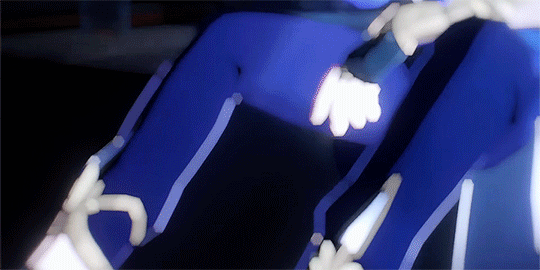
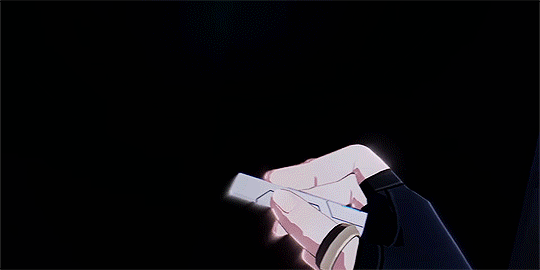
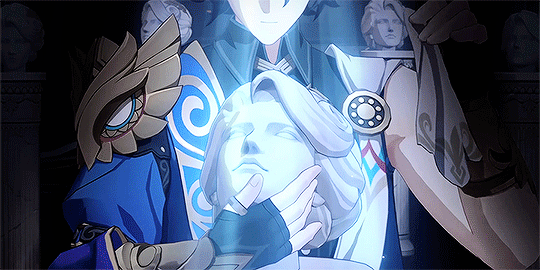
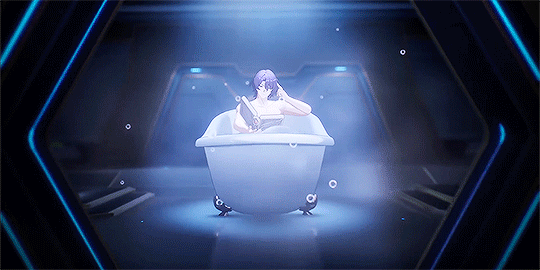


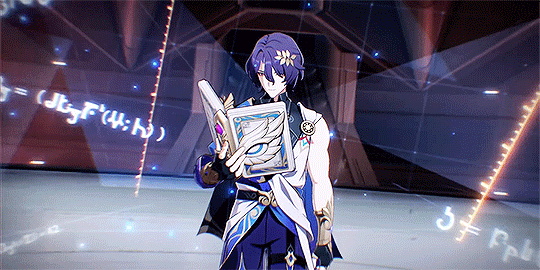
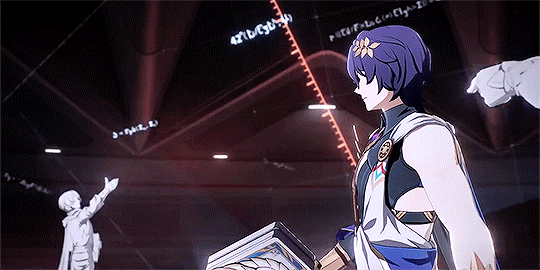

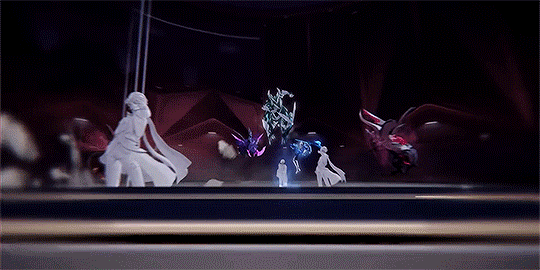
DR. RATIO Honkai: Star Rail | 2024
#ipost#honkai star rail#honkai#star rail#dr. ratio#ratio#veritas ratio#I love love love him#video game#vg#honkaiedit#honkai: star rail edits#honkai: star rail gifs#honkai: star rail#dr ratio#honkai star rail gifs#honkai star rail edits#ipost-gif
228 notes
·
View notes
Text
Sometimes I want to draw something hot 🔥
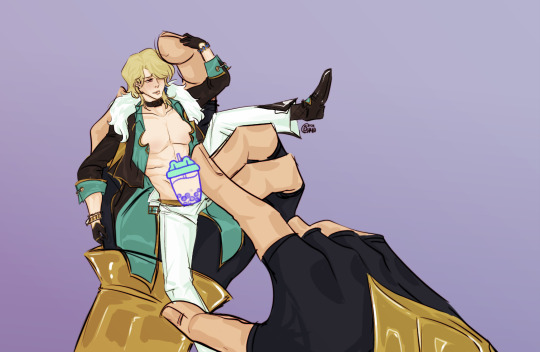
And, yes, a small part of the game gives me this pretty idea. I don't regret anything.
#art#artgallery#artists on tumblr#anime art#artist#anime#game#fanart#oc#video games#hsr veritas#hsr dr ratio#hsr aventurine#hsr fanart#hsr#ratio honkai star rail#aventurine honkai star rail#honkai star rail#honkai fanart#honkai star rail aventurine#honkai star rail art#honkai star rail dr ratio#so hot 🔥🔥🔥#hot as hell#yaoi#yaoi hsr#aventio#ratiorine
44 notes
·
View notes
Text
I find the Scholars' Strife to be extremely interesting, I didn't initially pay attention to the actual story when playing but re-reading up on it I think it depicts my thoughts on Ratio's issues with both the Intelligentsia Guild and the Genius Society.
It's stated on the wiki that: "It was decided that whoever possessed the most valuable research and could solve greater problems would own the Scepters." which, essentially, is another way of saying 'Whoever is decided to be the smartest gets both recognition for being selected and additional resources.' The existence of the Scepters sparked various 'attacks' from one school to another in order to prove that they deserve to be considered for owning more.
This, to me, sounds similar to people trying to join the Genius Society. Although I don't believe it's meant to be a direct representation (nor does this event mention Ratio anyway) but it seems to me that they fit. The data bank on the Genius Society states: "There are also those who rejoice, thinking they have already reached greatness and had created priceless asset of civilization with their diligence and wisdom. They were sure that their life's achievements deserve Nous's approval." Which fits directly into the Scholars' Strife of 'thinking they deserve what they don't, but could, have.'
The data bank also states in regards to the Scholars' Strife that: "The Guild's knowledge and ideals were no longer pure, leaving only ugly conflicts behind." Which, to me, perfectly encapsulates what I believe to be Ratios issue with both the Guild and the Society. Every party is entirely focused on themselves and what they can gain that they simply don't care for actually spending knowledge and truth.
#i was going to post about Ratio and Sunday in honor of his drip marketing but ive yet to find a video of just those two interacting so i#can look at dialog without skipping through half the penacony story#so have this instead#for now#ill get to the prior eventually..#big fan of the new simulated universe#sighs wistfully#please new ratio content soon i miss him...#★ – posts!#★ – analysis!#dr ratio#dr veritas ratio#veritas ratio#hsr dr ratio#hsr ratio#honkai star rail#hsr
44 notes
·
View notes
Text







Dr Ratio and Aventurine in Rota Fortunae, by Megane98, Unnämed/Lucien
#honkai star rail#hsredit#honkaiedit#veritas ratio#dr ratio#aventurine#video games#gifus#ratiorine#aventio#otp: do stay alive#THEY ARE IN LOVE YOUR HONOR#FORGET ABOUT THE ENDING EVERYTHING IS GOOD#they are so cute bro the height difference........#I'm: GONE 😭😭😭💕💕💕#they should kiss next actually !!!!!!!!!!!#also man this was impossible to color sorry#it's so dark
3K notes
·
View notes
Text
still comic is under the cut, but this one's with music :3

#unrequited love#from aventurine#angst#lol#my art#art#pickle picture post#hsr#honkai star rail#honkai fanart#hsr fanart#hsr aventurine#hsr dr ratio#veritas ratio#hsr veritas#dr ratio#aventurine#aventurine honkai star rail#aventio#ratiorine#hsr ratio#golden ratio#fanart#video
34 notes
·
View notes
Text
“I need a version where his ultimate hits but it's just falling_metal_pipe.mp4”
@king-alpha-wolfz-blog say no more
#I learned how to edit sound on my phone to make this—#THANK YOU ALPHA FOR THIS INCREDIBLE IDEA ASGKGSFJFJ#tbh it worked so well I didn’t even have to try hard#veritas ratio#falling_metal_pipe.mp4#honkai star rail#my post#video
49 notes
·
View notes
Text
kris - headcanons, theories, and analysis (a jumbled mess from yours truly)
kris has selective mutism and is semi-verbal: they have the capability of speech, but the extent to which they are willing and eager to speak at any given moment is highly dependent on their current mental state as well as the people around them. generally speaking, kris is not very talkative and infrequently starts or participates in conversation, even when in the presence of people they are comfortable with and when feeling fine; it is noted, though, that kris only ever actively wants to speak and is eager to do so in such situations -- when uncomfortable, kris will not speak unless direly necessary (and even then, their ability to speak is not guaranteed). also worthy of note is how unexpressive kris's face tends to be; they rarely wear anything other than a blank expression. exceptions only occur under extreme, catastrophic distress, or when around friends and family -- kris has been known to laugh, especially since they would like making mischief.
in kris's youth, they had close, warm relationships with their adoptive mother, toriel, their adoptive father, asgore, their adoptive brother, asriel, their next-door neighbor and friend, noelle, and, to a slightly lesser extent, noelle's sister, dess, and father, rudy. while still quiet most of the time, kris would actively want to speak to them on some occasions, and would often be happy to point out things to them (kris is a very observant person, noticing small details in their environment) and play games that had some minor speaking component (such as playing a video game in which comments are often exchanged between players). given their emotional proximity to kris, these individuals knew kris well enough to have a general sense of how they were feeling, even in moments when kris wasn't in the mindspace to speak; asriel and noelle could tell what kris was feeling better than anyone else, asriel especially understanding why kris felt what they did (noelle always knew what kris felt, but often didn't understand why they were feeling it and required an explanation kris wasn't able to provide), and so kris was very attached to them. however, this attachment was wrought with insecurity: asriel was growing up, soon to leave for college, and a well-beloved golden boy; noelle was always leagues better than kris in school, and a darling, endearing girl; kris couldn't help but fixate on asriel and noelle leaving them someday.
unfortunately, a cascade of events eventually pulled the majority of kris's loved ones away from them, including azzy and noelle. dess disappeared, splintering the relationship between kris's family, the dreemurrs, and noelle's family, the holidays; kris and noelle began to grow apart as their families lost touch; asgore was fired from his position as police chief, and toriel divorced him; finally, asriel went off to college. the only close connection kris maintained from their childhood was toriel -- and even if toriel never understood them quite as thoroughly as azzy or noelle, kris was still strongly attached to her and her ability to understand them at all, to the point that, in the absence of anyone else to connect with, kris became very clingy to her. kris has been massively lonely and depressed, fixated on the great time asriel must be having in college and how happy and beloved noelle seemed to be -- while they've been alone, with nobody to truly know how they feel when they're uncomfortable. oh, and how often kris is uncomfortable! basically friendless, constantly sleep-deprived, and harboring a hidden self-loathing stewing in their soul since their childhood… since asriel moved away, kris has been quieter than ever, unable to express the pain festering within. they were never that expressive, but that seemed to have come to a head, with kris becoming almost completely unresponsive to any emotional stimuli. kris seemed completely unfazed by susie's cruel bullying when she joined the class… however, her words seemed to strike a chord deep, deep within them, and they couldn't help but laugh.
since the player has taken control over kris's soul near the beginning of the game, however, kris's verbal "self"-expression has increased. the player can compel kris to speak -- not only in moments where kris would choose to speak themselves, in which the player just directs what it is they are to say (possibly contradicting what kris wants to say), but also in moments where kris would be uncomfortable and wouldn't even be willing to speak at all. the player seems to not have control over kris's facial expression, however -- so, despite having suppressed most show of emotion in recent months, kris now has the chance to take advantage of their ability to communicate their true feelings through their face, and might well seize it… though, why would kris not take the player's manipulation as another sign from above that they will never be understood? why even try? regardless what they think, though, a certain primal desire to be understood overrides any logic or loss of hope: like always, if disturbed enough, kris's face will show it; likewise, if something strikes their funny bone -- or if it strikes a chord deep, deep within them -- kris will laugh.
kris, no matter what, does not like being suppressed, and even if the player isn't hurting them (which can certainly, certainly happen), kris will have some negative opinion of them. they want to be loved and understood for who they truly are, more than anything else in the world, and the player, even if unintentionally, is actively undermining that. if we imagine some alternate timeline, where kris made friends with ralsei and susie all on their own, that friendship having formed at all would imply that kris believes that ralsei and susie either do or will love and understand kris for who they truly are; why would kris become friends with them otherwise? in this hypothetical, kris would learn that they aren't truly alone, and that there are always people to connect and relate to, if they believe they're capable of being understood -- that they don't have to wait forever for people like asriel. however, as the "friendship" kris has with ralsei and susie is entirely manufactured by the player and the game, it is little more than a distant dream. as we control kris's body and words, it's as if kris's self is watching what "they" do from within themselves, looking at the friendships "they" have and wishing they were truly theirs: it is dissociation, a feeling that these relationships aren't real.
at the same time, though, kris desires these relationships as they currently are, even in their apparently empty state, or wants to desire them; kris desires a world in which they aren't constantly craving understanding, in which closeness was taken for granted, in which they were open and talkative, in which, perhaps, they were a different person who isn't such a weird, quiet loser. this is what the player provides; this is what the dark world provides; this is what the game provides. the dark world is a game that kris is playing: it is doubtful that kris summoned the player to control them, but the player's control is what gives kris these relationships, and so, in some strange way, kris might desire the player as much as they hate the player. kris has never been good with people, but now they can be piloted by someone who, via the game (which, notably, is a path ralsei sets for us: the prophecy), follows a relatively stable path in which they must be good with people. chapter 1 always ends with kris being "friends" with ralsei and susie, with kris doing the "right thing", with kris being "happy". perhaps kris can come out of chapter 1, half-satisfied with having lived vicariously through themselves. chapter 2 is largely the same for basically every player, and would perhaps result in noelle genuinely, earnestly reconnecting with kris (kris themselves) through their adventure in the dark world; however, if the player tries hard enough to defy the game's path, they can force kris to do terrible things to people: to emotionally abuse noelle right as she was about to rekindle something with kris, manipulating her into killing someone. this, obviously, would f*ck kris up, the main reason for which need not even be spoken. but there is something more subtly tragic about it all: that the one genuine, non-vicarious, non-player relationship kris might foster through the game -- their faded friendship with noelle -- was forcibly dashed on the rocks with kris's own, puppeted hands. is that not horrible?
no matter what path the player makes kris take in either chapter, kris removes their soul each night (twice during chapter 2) and, shambling like a silent zombie, performs some impulsive, violent act with their knife -- cutting a pie, slashing toriel's car tires, or opening a dark fountain. worthy of note is that the soul the player controls is still kris's soul, and yet they are willing to literally remove their soul, the culmination of their being, to be free of us from a little while. in two of three cases, kris clearly returns the soul to their body; in the third at the end of chapter 2, they hold it up as their handmade dark fountain billows smoke, and it is ambiguous what they do with it. are they gazing at it in awe, or glaring at it in disgust? how much do they need the soul, and how much can they act without it? will they return it to their body? the player, the dark world, and the game are what allow kris to reconnect with noelle -- or break her. in the former case, kris might be opening a dark fountain in the hopes that perhaps more good will come out of this strange system of control at which they are centered; in the latter, they might be opening it to spite the player's attempts at closing dark fountains, in accordance to ralsei and the game's will. true, the path that leads kris to manipulate noelle is one that defies the game's central intent -- but the game still allowed it to happen, tantalizing the observant player with a secret route. or, in both cases, kris just might want to create a dark world where their mother is present, given that the dark world has either brought people closer to them, or left them completely alone…
#melonposting#deltarune#deltarune kris#kris dreemurr#deltarune analysis#deltarune theory#deltarune headcanon#it really is a mix of all three. it was supposed to just be headcanon but i got lost in the sauce#so there's a lot of genuine analysis/speculation here about kris's relationship with the player + their feelings on ralsei and susie#i got a lot of inspiration from vivat veritas's 'a re-deconstruction of deltarune's ralsei' on youtube#linked here: https://www.youtube.com/watch?v=GOGKid3_9mc#which framed the light world as viewing the dark world in the same way the player views the light world: as a video game#kris is such a fascinating character. even if i'm wrong about everything (though i know i'm not!!!)#i wasn't lying when i said i'd put that son of a butch (gender neutral) under a microscope#graaaaaghh!!!!!!!!!!!!!!!!!!!!!!! i need to eat rocks
8 notes
·
View notes
Text
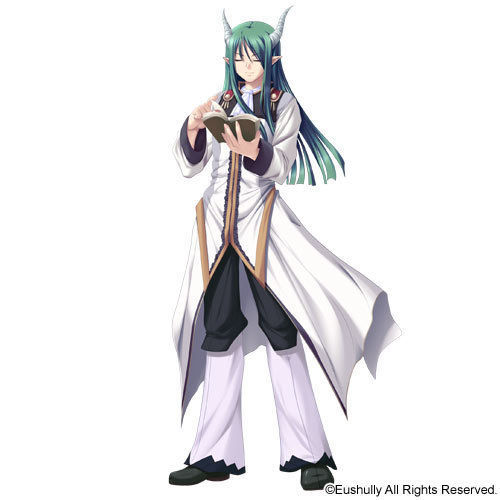
Paimon - H-Game: Battle Goddess VERITA
#Paimon#H-Game: Battle Goddess VERITA#anime character#anime aesthetic#oc aesthetic#video game character
3 notes
·
View notes